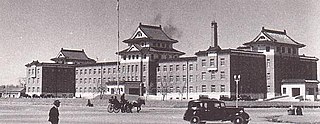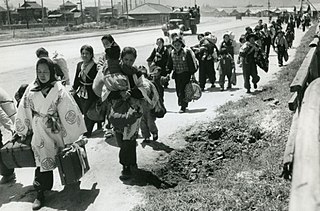
Manchukuo, officially the State of Manchuria prior to 1934 and the Empire of (Great) Manchuria after 1934, was a puppet state of the Empire of Japan in Manchuria from 1932 until 1945. It was founded as a republic in 1932 after the Japanese invasion of Manchuria, and in 1934 it became a constitutional monarchy under the de facto control of Japan. It had limited international recognition.

The Mukden Incident, or Manchurian Incident, known in Chinese as the 9.18 Incident (九・一八), was a false flag event staged by Japanese military personnel as a pretext for the 1931 Japanese invasion of Manchuria.

The Chinese Eastern Railway or CER, is the historical name for a railway system in Northeast China.

The Soviet invasion of Manchuria, formally known as the Manchurian strategic offensive operation or simply the Manchurian operation, began on 9 August 1945 with the Soviet invasion of the Japanese puppet state of Manchukuo. It was the largest campaign of the 1945 Soviet–Japanese War, which resumed hostilities between the Union of Soviet Socialist Republics and the Empire of Japan after almost six years of peace. Since 1983, the operation has sometimes been called Operation August Storm after U.S. Army historian David Glantz used this title for a paper on the subject.

Manchukuo was a puppet state set up by the Empire of Japan in Manchuria which existed from 1931 to 1945. The Manchukuo regime was established four months after the Japanese withdrawal from Shanghai with Puyi as the nominal but powerless head of state to add some semblance of legitimacy, as he was a former emperor and an ethnic Manchu.

The Manchukuo yuan was the official unit of currency of the Empire of Manchuria, from June 1932 to August 1945.

The Central Bank of Manchou, was the central bank of the Japan-sponsored state of Manchukuo. The bank was established by the Bank of Manchukuo Act at Hsinking on 11 June 1932, as a joint stock company with a capital of 30,000,000 yuan, with the government holding at least 25% and at most 50% at any time. The bank officially opened its doors for business on July 1 as the amalgamation of the four note-issuing banks active in Manchuria prior to that time, namely: the Bank of the Three Eastern Provinces, the Bank of Kirin, the Bank of Heilungkiang and the Frontier Bank controlled by local warlord Zhang Zuolin. It was later revealed by audits that acquiring the four previous banks of Manchuria to be financially irresponsible as the Central Bank of Manchou held a deficit of 30,000,000 yuan in combined liabilities, but the action was deemed necessary as it was the only way to get rid of the overabundant currency issued by those banks in Manchuria in order to create a better foundation for the new Manchukuo yuan. When the Central Bank of Manchou was created it had a sufficient number of gold reserves for the new currency and paid out a dividend of 6% to investors, the stable value of the Manchukuo yuan was a major contributing factor for the development of the economy of Manchukuo.

The Manchukuo Imperial Guards were an elite unit of the Manchukuo armed forces created in 1933. It was charged with the protection of the Kangde Emperor, the imperial household, and senior members of the Manchukuo civil government. Their garrison and headquarters were situated in the capital of Xinjing, adjacent to the Imperial Palace.

Zhang Jinghui ; was a Chinese general, warlord and politician during the Warlord era. He is noted for his role in the Japanese puppet regime of Manchukuo in which he served as its second and final Prime Minister.

The Manchukuo Imperial Army was the ground force of the military of the Manchukuo, a puppet state established by Imperial Japan in Manchuria, a region of northeastern China. The force was primarily used for fighting against Communist and Nationalist guerrillas in Manchukuo but also took part in battle against the Soviet Red Army on several occasions. It initially consisted of former National Revolutionary Army troops of the "Young Marshal" Zhang Xueliang who were recruited after the Japanese invasion of Manchuria en masse, but eventually expanded to include new volunteers and conscripts. The Imperial Army increased in size from about 111,000 troops in 1933 to an estimated strength of between 170,000 and 220,000 soldiers at its peak in 1945, being composed of Han Chinese, Manchus, Mongols, Koreans, Japanese, and White Russians. Throughout its existence the majority of its troops were considered to be mostly unreliable by their Japanese officers and advisers, due to poor training and low morale.

The Manchukuo Imperial Navy was the navy of the Japanese puppet state of Manchukuo.
The Defense of Harbin occurred during the early Second Sino-Japanese War, as part of the campaign of the Invasion of Manchuria by forces of the Empire of Japan from 25 January to 4 February 1932.

Ding Chao was a military general of the Republic of China, known for his defense of Harbin during the Japanese invasion of Manchuria in 1931 and 1932.

The Pacification of Manchukuo was a Japanese counterinsurgency campaign to suppress any armed resistance to the newly established puppet state of Manchukuo from various anti-Japanese volunteer armies in occupied Manchuria and later the Communist Northeast Anti-Japanese United Army. The operations were carried out by the Imperial Japanese Kwantung Army and the collaborationist forces of the Manchukuo government from March 1932 until 1942, and resulted in a Japanese victory.

The Northeast Anti-Japanese United Army was the main anti-Japanese guerrilla army in Northeast China (Manchuria) after the Japanese invasion of Manchuria in 1931. Its predecessors were various anti-Japanese volunteer armies organized by locals and the Manchuria branches of the Chinese Communist Party (CCP). In February 1936, the CCP, in accordance with the instructions of the Communist International, issued The Declaration of the Unified Organization of Northeast Anti-Japanese United Army and marked the official formation of the organization.
Li Hai-ching, or Li Hai-Tsing, was the leader of about 10,000 Anti-Japanese guerrilla troops in the south of Kirin, now Heilongjiang province, resisting the pacification of Manchukuo. They called themselves Anti-Japanese Army For The Salvation Of The Country and were described as being equipped with light artillery and numerous machine guns. Li established his headquarters at Fuyu and were in control of the territory there and southward as far as Nong’an.

Aisin-Gioro Xiqia (Aisin-Gioro Hsi-hsia; Chinese: 愛新覺羅·熙洽; pinyin: Àixīnjuéluó Xīqià; Wade–Giles: Ai4-hsin1-chüeh2-lo2 Hsi1-ch'ia4; 1883–1950), commonly known as Xi Qia or Xi Xia (Hsi Hsia; Chinese: 熙洽; pinyin: Xīqià; Wade–Giles: Hsi1-hsia4; Hepburn: Ki Kō), was a general in command of the Kirin Provincial Army of the Republic of China, who defected to the Japanese during the Invasion of Manchuria in 1931, and who subsequently served as a cabinet minister in Manchukuo.

The territorial conquests of the Empire of Japan in the Western Pacific Ocean and East Asia began in 1895 with its victory over Qing China in the First Sino-Japanese War. Subsequent victories over the Russian Empire and German Empire expanded Japanese rule to Taiwan, Korea, Micronesia, southern Sakhalin, several concessions in China, and the South Manchuria Railway. In 1931, Japan invaded Manchuria, resulting in the establishment of the puppet state of Manchukuo the following year; thereafter, Japan adopted a policy of founding and supporting puppet states in conquered regions. These conquered territories became the basis for the Greater East Asia Co-Prosperity Sphere in 1940.

The Kwantung Army was a general army of the Imperial Japanese Army from 1919 to 1945.

The Japanese settlers in Manchuria were the Japanese immigrants who came to Manchuria after the Russo-Japanese War and settled in zones of Japanese interests.















